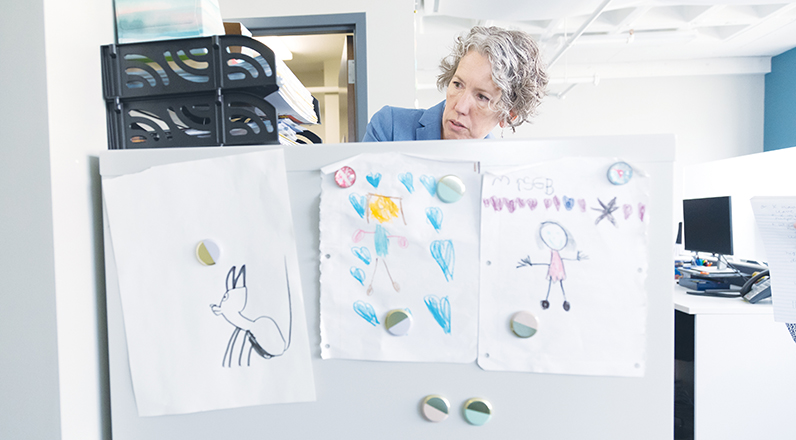
The Kids First Law Center is among the nonprofits that get nearly free office space from Mercy Cedar Rapids. Kids First Executive Director Jenny Schulz is at the office of that organization for kids navigating their parents' conflicted relationships. Credit: Josh Booth /Diamond Label Films
CEDAR RAPIDS, Iowa — When a disastrous flood in 2008 displaced numerous nonprofits and simultaneously hyperinflated the cost of office space here, Mercy Cedar Rapids came up with a creative idea that has since benefited multiple nonprofits, their clients, the community and the health system.
The health system transformed a somewhat dilapidated 100-year-old building it owned near its campus from an underutilized storage site into a vital hub for nonprofits. The building houses five mission-based organizations, at negligible cost to those tenants.
The arrangement has allowed Mercy Cedar Rapids to serve the community in a distinct way and the center's tenants to direct funds that normally would go toward leasing or renting office space to programming, services and material aid to vulnerable people.
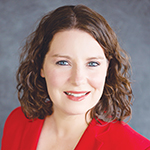
The Sisters of Mercy established Mercy Cedar Rapids with a mission to serve people in need, says Melissa Dean, director of health equity and community partnerships at the 424-bed Mercy Medical Center, part of Mercy Cedar Rapids. She says with the nonprofits hub, "we are continuing to address needs in a way that the founding sisters would wholeheartedly support. There's a spirit in this building — the people here love what they do, they have a passion for serving others. The work they're doing is really hard, but they have that spirit."
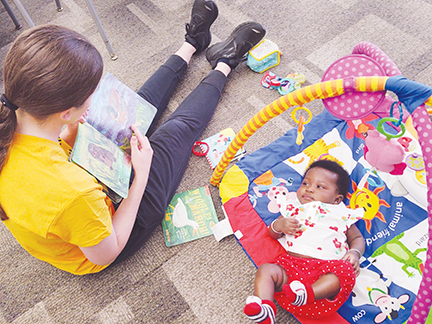
Alejandro Pino is executive director of the nonprofit YPN (formerly, Young Parents Network), which is a center tenant. He says, "Mercy's presence is seen and felt throughout the community. Our mission aligns with their focus of service."
A building with a purpose
On June 13, 2008, the Cedar River that runs through Cedar Rapids crested at 31.12 feet, more than 11 feet higher than the prior record. The waters flooded 10 square miles, or 14%, of the city. An estimated
1,300 damaged properties had to be demolished. Nonprofits were among the 486 tax-exempt facilities hit.
In the wake of the disaster, many nonprofits had nowhere to go. Their spaces were unsalvageable. But they couldn't afford to relocate, since undamaged office space in Cedar Rapids was at a premium. For Boys & Girls Clubs of the Corridor, for instance, the $250,000 insurance reimbursement would not cover the rebuilding cost, and the city declared eminent domain on the club's old site.
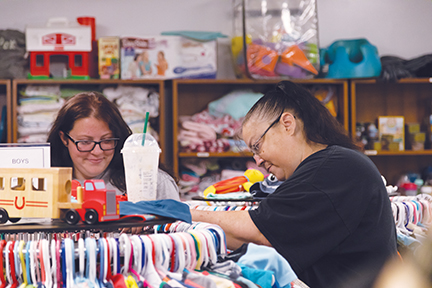
Sr. Susan O'Connor, RSM, then Mercy Cedar Rapids vice president of mission integration, became aware of the nonprofits' office space problem and remembered that the one-hospital health system already had allowed nonprofit organizations to have free office space in a building owned by the hospital before. She wondered: Could Mercy Cedar Rapids again house nonprofits?
Then-Mercy President and CEO Tim Charles joined Sr. O'Connor as the driving forces behind an effort to transform a underused building that it owned into a hub for nonprofits.
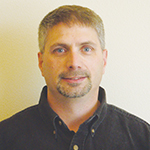
John Tursi, executive director at Boys & Girls Clubs of the Corridor, recalls that Sr. O'Connor said, "We want this to be a community space for like-minded organizations."
Up to code
When some prospective tenant organizations had an architect assess the suitability of the facility that Mercy leadership had chosen to be an office hub, that expert said it would cost millions of dollars to bring it
up to code, recalls Tursi, head of one of those organizations. He says Charles told the nonprofits that Mercy would figure out how to make it work.
Mercy narrowed its tenant list to four nonprofits and partnered with them to develop the space. Those original tenants were Kids First Law Center, Young Parents Network, Gems of Hope and the Boys & Girls Clubs.
To renovate, Mercy invested some of its own capital, and the nonprofits raised over $600,000 to assist.
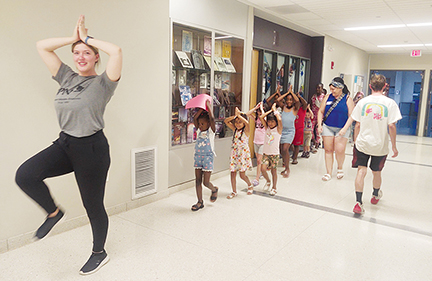
The two-story building, which had been used at various times as a laundry facility, a Penny Saver publication office and for hospital storage, required a near-total overhaul. This included gutting the interior; subdividing the space for offices; adding some square footage; creating new stairwells and windows; installing an elevator; building restrooms; installing water systems, heating and air conditioning and electrical; and adding interior design elements.
The grand opening was in September 2011. The health system dubbed the hub the Sister Mary Lawrence Community Center. Sr. Mary Lawrence Hallagan, RSM, was a Mercy administrator and Sisters of Mercy congregation head who was affectionately known as "the builder" for spurring great expansion at Mercy, especially during the 1950s and 1960s. She died in 1999.
Two nonprofits became center tenants after the original four: Metro Catholic Outreach and an office of the Catholic Charities of the Archdiocese of Dubuque. The Gems of Hope cancer charity is to move out later this year. Its space needs have changed.
Cost avoidance
The tenant organizations pay $1 per year to lease their space.
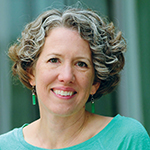
Jenny Schulz, attorney and executive director of Kids First, says conservative estimates are that office space would cost well over $1,500 per month, so the nonprofits are saving more than $18,000 annually in rent. But, she says, the tenants get much more than practically free space. They get access to the building's shared conference rooms, bathrooms, break room and an internet and telephone system. They also have access to locked storage in the building's basement — an essentiality for Metro Catholic Outreach's food pantry and for YPN's large cache of diapers.
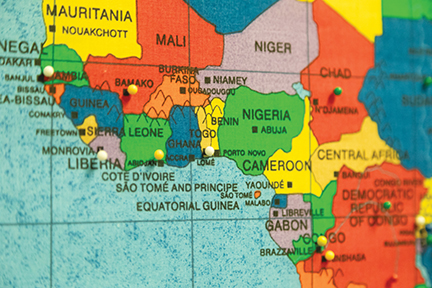
Mercy handles janitorial services, maintenance, grass mowing, snow removal and security for the common spaces of the building. The tenants just pay the costs for their own spaces — utilities, cleaning, upkeep and decor.
Kate Leonard-Getty, Metro Catholic Outreach executive director, says without the cost avoidance inherent in being a center tenant, "we couldn't exist."
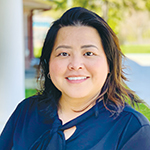
Yer Vang, director of Immigration Legal Services for Catholic Charities of Dubuque, says with costs rising for staffing and other business expenses, it is a godsend not to have to budget for expensive office space as well.
The nonprofit directors — Getty, Pino, Schulz, Tursi and Vang — all say that their organizations absolutely are able to deliver many more services and other aid to vulnerable populations of Cedar Rapids because they are in the hub.
Fringe benefits
Being co-located has many benefits, say the nonprofits' directors.
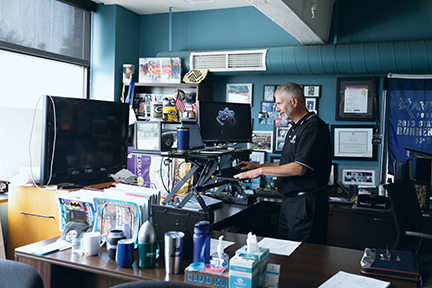
It is common for the organizations to refer their clients to the other organizations at the center. Vang says many of the immigration service's clients have low incomes and language and transportation barriers, — so it's an added benefit that those individuals can get many other services in the building.
Schulz adds that she likes that her office can do "warm handoffs," walking clients to the other organizations. Pino says just giving people a phone number for a recommended service provider "is not entirely helpful or compassionate" for people who struggle to access services.
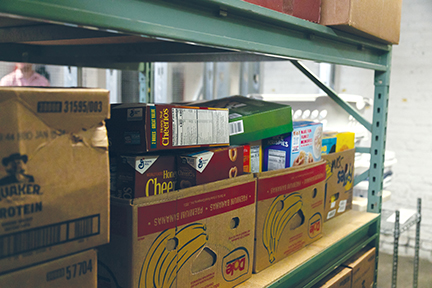
A strong sense of community has emerged among the nonprofits. Schulz says she has relied upon other directors in the building for advice, and they upon her. For instance, they compared notes on how to handle COVID-19 protocols and vaccinations. They've also shared ideas with one another on how to partner on advocacy efforts on behalf of their clients.
Payoff
Dean says Mercy gets many benefits from the hub. For one, the organizations are meeting crucial social needs, and addressing social determinants of health is a priority for Mercy. Supporting these nonprofits means strengthening
a social safety net for the community, including Mercy patients and staff who are in need. In fact, Mercy staff commonly refer patients to the organizations in the hub.
Additionally, by hosting these nonprofits, Mercy can become involved and connected with them in a more integral way, Dean says — Mercy can watch their work in action.
"This is a way we can be a small part of this incredible work that they are doing, and to support their expertise," Dean says. "And it's a really unique way to understand on a deeper level what is happening at nonprofits in our community."
